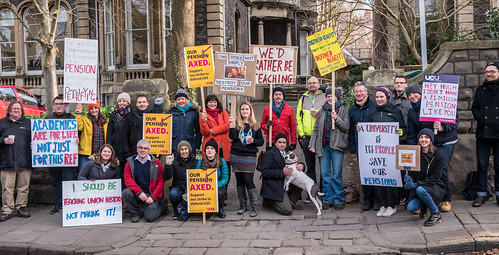Taken last week on a walk with Harry Brighouse. I had the thought at the time that we were not so far from regular photo-commenter Alan White.
From the category archives:
Academia
During the past term, I was on strike for fourteen days and I’m now on “action short of a strike” and, like my colleagues up and down the UK, I’m waiting to vote in a consultative e-ballot next week that may determine whether we reach a settlement with the employers and go back to work. But this post isn’t about the rights and wrongs of the dispute, it is about what it has felt like to be on strike — the highs and the lows — and about how the shared desire for a better university that has emerged from our unity and solidarity may be helped or hindered by how the strike is resolved and by the stories we tell ourselves about it.
A big part of striking (at least for those who choose not to sit at home) is picketing. I’ve been on picket lines (a long time ago) where the purpose of picketing was to stop people from going to work, but our picket lines now have been more symbolic and demonstrative. They’ve been about standing together, feeling a sense of comradeship, and sharing jokes and conversation. In this we’ve been joined by many of our students, giving rise to a renewed feeling of the university as an intellectual community bringing together teaching and research staff, other university staff and students and joining us together across disciplinary boundaries. This experience, together with associated demonstrations, teach-ins lunches, coffees and social events, has been the source of a growing sense of collective determination that a different kind of university is possible and that we mustn’t go back to the normality of submission to bullying micromanagement, the obsessive chasing of metrics and rankings and individualized anxiety and self-loathing.
[click to continue…]
Thanks to everyone who the first six chapters of my book, Economics in Two Lessons. That brings us to the end of Lesson 1: Market prices reflect and determine opportunity costs faced by consumers and producers.
Now its time for Lesson Two: Market prices don’t reflect all the opportunity costs we face as a society.
I’ll start with a brief intro and then the draft of Chapter 7: Property rights, and income distribution
As usual, I welcome comments, criticism and encouragement.
[click to continue…]
For a couple of days I’ve been tweeting about the Financial Times’ decision to have Steve Bannon as its “keynote interview” in a conference on the future of news in New York, on 22 March.
Fresh from his tour of Europe where Bannon told his rabid fans being called a racist is a “badge of honour”, Bannon has declared himself the “infrastructure” of the world’s far right.
As Bannon spent the last week holed up in luxury hotels one wonders at him being able to afford, and soliciting Europe’s far right ‘politicians, operatives and investors’, he told the New York Times: “…he was weighing whether to buy a name-brand outlet, like Newsweek or United Press International, or to start a new one, or to connect entrepreneurs with capital or invest himself.”
Bannon wants money to start a new, far right media venture. What better place to do that than the world’s financial and media hub?
Enter the FT.
Belle and I are watching Annihilation on Netflix. We are about 50 minutes in. This just makes no sense. These people. But maybe it’s worth watching until the end? What do you think?
Or leave a comment.
(I understand the book was better.)
UPDATE: the Plain People of the Internet have spoken. I guess we’ll watch the rest a bit later. (We did other stuff last night.) The main problem with the film, in a nutshell, is that you have a small group of scientists going into this mysterious area, the Shimmer. Everything they know indicates that their safety measures are ludicrously insufficient. They aren’t wearing hazmat suits even though they have every reason to expect radiation or poisonous atmosphere or environment. They are not soldiers, but they are armed. They are all neurotic loners (who else would volunteer for this mission? But there’s limits to the ‘send in people who don’t have a lot of close family’ strategy.) The result is that their actions and reactions, in the Shimmer, aren’t interesting, since they consistently mismatch the situation. There’s a fine line between surreal and stupid, and the film is not managing to keep its small team of scientists on the former side of the divide, in this weird place.
Photography can’t always be about aesthetics. As [Miriam posted about the other day](https://crookedtimber.org/2018/03/05/44049/), academics and many academic-related staff in the UK are currently on strike in defence of our pensions which are under threat from a plan to shift all the risk from institutions to individuals and to leave us thousands of pounds worse off in our retirement. It is a considerable achievement for managers paid vast sums of money on account of their managerial abilities to have engineered a situation where their staff vote 9:1 for strike action. Anyway, it has, so far been a determined and somewhat joyful action in which we have rediscovered what we have in common. However this ends (and the signs are good) the atmosphere in our workplaces will have changed forever. People really are really missing their students, teaching, and research and are loving the support and solidarity we’ve had from our students. But I doubt that bullying micromanagement will be as passively accepted in the future as it has been in the past.
Last month The Right To Have Rights, an edited collection I contributed the afterword to, came out with Verso. Crooked Timber’s own Corey Robin was kind enough to provide an endorsement for the book, which he called “a marvelous deconstruction of a vexing concept, and a wonderful new way of doing theory.” Not bad!
The book’s form is indeed unique – each of the collaborators takes on a portion of Hannah Arent’s now famous phrase from The Origins of Totalitarianism “the right to have rights” (interestingly, the provocative formulation was initially overlooked by readers and not something Arendt lingered on or made much of). Stephanie DeGooyer tackles “The Right,” Lida Maxwell examines “To Have,” Samuel Moyn reflects on “Rights,” and Alastair Hunt addresses the implicit question, “of Whom?”
I’ll just say that writing the afterward was a real treat, mainly because I had never had the chance to deeply engage with Arendt before (I had read a few chapters, essays, and excerpts here and there and seen both of the recent movies about her released by Zeitgeist Films, but that was about it). Though I was glad to have an excuse to dig in, my contribution is a rather unorthodox (and not very Arendtian) reading informed by my reporting on the refugee crisis in 2015 and my ongoing economic justice work.
Building on the main contributions, I look at the way people’s citizenship rights are being undercut in an age of globalized capitalism and how neoliberalism and ethno-nationalism are dangerously entwined. As an activist, invoking rights can become a kind of reflex or habit, and sometimes (if I’m honest) a substitute for other kinds of argumentation and imagination, so it was also good to have an occasion to step back and ponder what we’re really talking about when we talk about rights or make entitlement claims. I’m not about to dismiss rights as nonsense upon stilts or bourgeois individualism run amok, but I emerged from this project more critical than when I began. I will certainly be more deliberate (and hopefully more forward-looking or even out there) in any rights demanding effort I’m part of as a result.
In honor of the book’s publication, I asked each of the contributors to share some thoughts in response to the same prompt. I asked them to reflect on what, if anything, grounds rights and whether we might need to start thinking about rights in new ways. Their replies are below.
I’d be curious to hear others reflect on the same prompt in the comments should inspiration strike.
The question of how rights might be recognized and fulfilled is a far more interesting and difficult question than what rights are in themselves. We tend to think of rights as the sacrosanct property of certain subjects: the right of individuals to bear arms, the right of citizens to vote, or the right of human beings to life itself. But rights are not inborn properties. If they were, we would never have to exercise a demand or make a claim for them. As much as we can assert a right, there must be a larger communal body that feels obliged or compelled to assume the burden of making sure we can enjoy this right. The question of how we might compel individuals, corporations and states to take up a responsibility for the rights of others is the question we should be asking. – Stephanie DeGooyer
We tend to think of rights as self-evident, as grounded in our equality as human beings. But that ground, historically, has been shaky: claims about who is _truly_ human have served to exclude, disenfranchise, and license mass violence against marginalized peoples. Arendt alerts us to the shakiness of the ground of rights, and shows us that the way we can stabilize it is not through appeals to morality, but rather through political action and staging of rights. We “have” rights like we “have” a party or a conference: we have to collectively stage, enact, and demand that we all be treated as individuals capable of claiming our rights. We – as collective political actors – are the constantly changing, yet crucial, figures that give rights-claimers a ground to stand on. – Lida Maxwell
Arendt’s reflections remind us how little has been done to guarantee rights, especially for outsiders to existing states — as well as insiders whose protections are increasingly precarious, and risk becoming outcasts in their own lands. It remains true today that too many people, as Arendt observed, are driven to assert their “humanity” — or have others assert it for them — in the absence of any grounds for rights. – Samuel Moyn
Human beings, we say, are born with rights. But rights are not really a function of anyone’s biological make-up: they are things we can enjoy only as members of a political community made when individuals act together in concert. Historically when individuals have joined communities, it often came as a big surprise to existing members. A telling mark of the quality of our political communities is whether we reject or welcome those who, because they are rightless, need to become members. – Alastair Hunt
Ingrid has suggested that I write a short post giving a general overview of the current strike action in UK universities, as many CT readers based outside of the UK might actually not know much about it. I am very happy to do so.
UK-based academics are currently engaging in the most massive industrial action ever undertaken by the sector. After being on strike five days overall over the past two weeks, they are committed to an escalation that will lead them to strike four out of five days this week and to a whole week walk-out next week. If negotiations do not progress sufficiently after this, the promise is to move to an assessment boycott. [click to continue…]
The Italian Democratic Party is caught on one tine of the post-democratic dilemma. It is trying to work within the system as it is, in the implausible hope that it can produce real change within a framework that almost seems designed to prevent such a thing. As the party has courted Grillo, it has started making noises about refusing to accept austerity politics and introducing major institutional reforms. It is unclear whether senior Democratic figures believe their new rhetoric; certainly no one else does. If the party does somehow come to power, the most it will do is tinker with the system.
The Five Star Movement has impaled itself on the other tine, as have the Indignados in Spain, Occupy in the US and UK, and the tent movement in Israel. All have gained mass support because of the problems of post-democracy. The divide between ordinary people and politicians has grown ever wider, and Italian politicians are often corrupt as well as remote. The Five Star Movement wants to reform Italy’s institutions to make them truly democratic. Yet it, too, is trapped by the system. As Grillo told the Financial Times in October: ‘We die if a movement becomes a party. Our problem is to remain a movement in parliament, which is a structure for parties. We have to keep a foot outside.’
… All are embroiled, in different ways, in the perplexities of post-democracy. None has any very good way out. Ever since France’s president François Mitterrand tried to pursue an expansive social democratic agenda in the early 1980s and was brutally punished by international markets, it has been clear that social democracy will require either a partial withdrawal from the international economy, with all the costs that this entails, or a radical transformation of how the international economy works.
It is striking that the right is not hampered to nearly the same extent. Many mainstream conservatives are committed to democracy for pragmatic rather than idealistic reasons. They are quite content to see it watered down so long as markets work and social stability is maintained. Those on the further reaches of the right, such as Greece’s Golden Dawn, find it much easier than the Five Star Movement or Syriza, the Greek radical-left coalition, to think about alternatives. After all, they aren’t particularly interested in reforming moribund democratic institutions to make them better and more responsive; they just want to replace them with some version of militaristic fascism. Even if these factions are unlikely to succeed, they can still pull their countries in less democratic directions, by excluding weaker groups from political protection. The next 10 years are unlikely to be comfortable for immigrants in southern Europe.
Post-democracy is strangling the old parties of the left. They have run out of options. Perhaps all that traditional social democracy can do, to adapt a grim joke made by Crouch in a different context, is to serve as a pall-bearer at its own funeral. In contrast, a new group of actors — the Five Star Movement and other confederations of the angry, young and dispossessed — have seized a chance to win mass support. The problem is, they seem unable to turn mass frustration into the power to change things, to create a path for escape.
Perhaps, over time, they will figure out how to engage with the mundane task of slow drilling through hard boards that is everyday politics. Perhaps, too, the systems of unrule governing the world economy, gravely weakened as they are, will fail and collapse of their own accord, opening the space for a new and very different dispensation. Great changes seem unlikely until they happen; only in retrospect do they look inevitable. Yet if some reversal in the order of things is waiting to unfold, it is not apparent to us now. Post-democracy has trapped the left between two worlds, one dead, the other powerless to be born. We may be here for some time.
Thierry Ngosso, a Cameroon philosopher (PhD Louvain-la-Neuve, currently based in Sankt Gallen), together with some other philosophers based in Belgium and the Netherlands, are organising for the fifth year a summerschool in political philosophy in Yaoundé. The aim of the seminar is “a genuine and lasting North-South conversation, understanding and solidarity in academic philosophy.” The seminar is open for PhD-students in philosophy/political theory from the Global North (who have to pay their own way) as well as for PhD-students from countries in the global South. The Yaoundé seminar has always been able to count on the support of a great line-up of professors, who also pay their own way.
In order to be able to waive fees and financially support the students coming from the South, the organisers have set up a fundraiser. They need 4000 Euro for this year’s travel grants, but have stated that any additional support will go to the travel bursaries at next year’s event.
I think this is a wonderful initiative, and hope that some of our readers will be willing to make a donation – whether small or larger. The donations are handled by Leiden University, and the page where you can make a donation can be found here.
My Erasmus Darwin post got such a huge response that a follow-up is in order!









